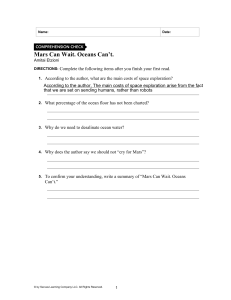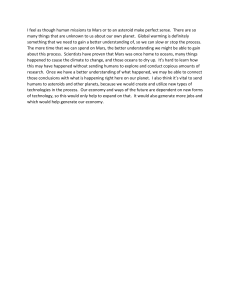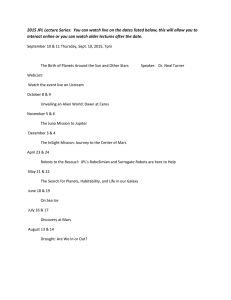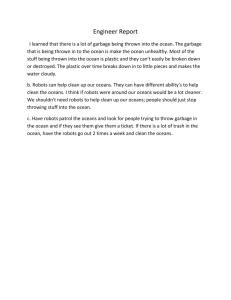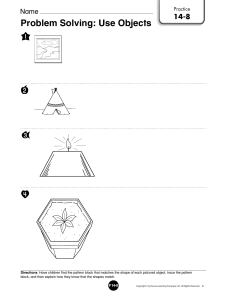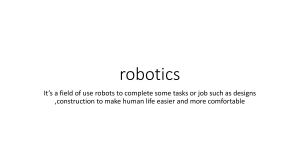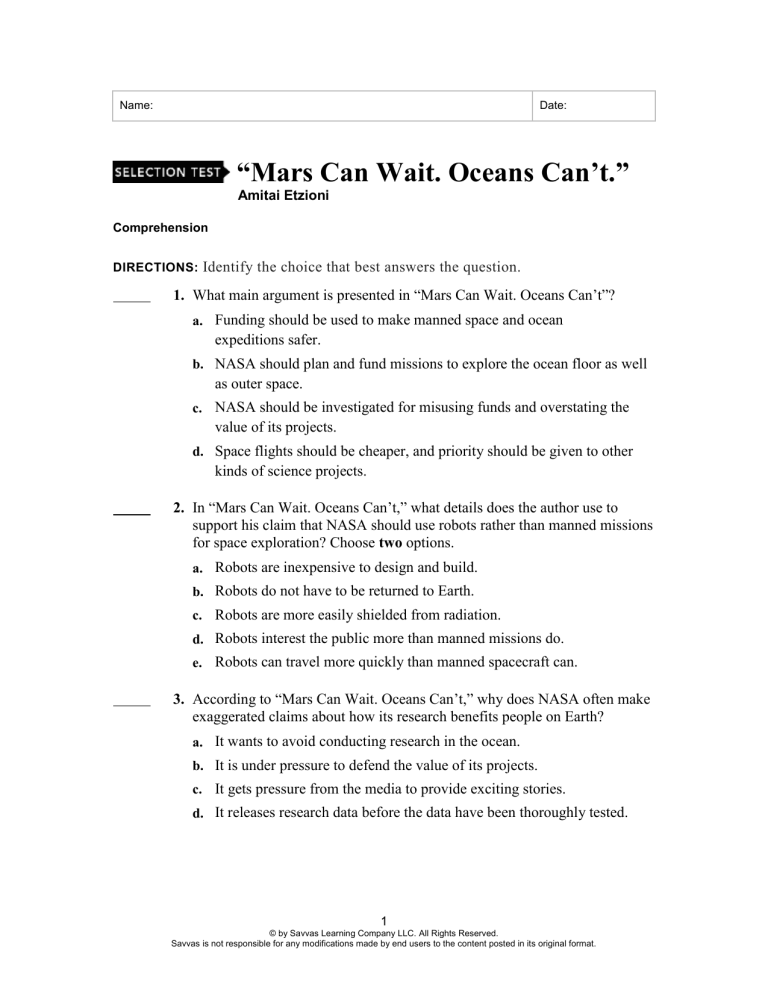
Name: Date: “Mars Can Wait. Oceans Can’t.” Amitai Etzioni Comprehension DIRECTIONS: Identify the choice that best answers the question. 1. What main argument is presented in “Mars Can Wait. Oceans Can’t”? a. Funding should be used to make manned space and ocean expeditions safer. b. NASA should plan and fund missions to explore the ocean floor as well as outer space. c. NASA should be investigated for misusing funds and overstating the value of its projects. d. Space flights should be cheaper, and priority should be given to other kinds of science projects. 2. In “Mars Can Wait. Oceans Can’t,” what details does the author use to support his claim that NASA should use robots rather than manned missions for space exploration? Choose two options. a. Robots are inexpensive to design and build. b. Robots do not have to be returned to Earth. c. Robots are more easily shielded from radiation. d. Robots interest the public more than manned missions do. e. Robots can travel more quickly than manned spacecraft can. 3. According to “Mars Can Wait. Oceans Can’t,” why does NASA often make exaggerated claims about how its research benefits people on Earth? a. It wants to avoid conducting research in the ocean. b. It is under pressure to defend the value of its projects. c. It gets pressure from the media to provide exciting stories. d. It releases research data before the data have been thoroughly tested. 1 © by Savvas Learning Company LLC. All Rights Reserved. Savvas is not responsible for any modifications made by end users to the content posted in its original format. Grade 7 • Unit 2 • SELECTION TEST “MARS CAN WAIT. OCEANS CAN’T” by Amitai Etzioni Concept Vocabulary DIRECTIONS: Identify the choice that best answers the question. 4. If a problem is described as severe, what is most likely true? Base your answer on the meaning of severe. a. It is likely to be resolved quickly. b. It is something that occurs frequently. c. It is serious and requires careful attention. d. It is something that was created by people. 5. Which of these is the best example of a dire warning? Base your answer on the meaning of dire. a. Turn off your cell phone during the performance. b. Do not enter! Employees only beyond this point. c. Please proceed with caution. Floor slippery when wet. d. Alert! Tornado warning in this area. Take shelter now. 6. If Stephanie said that she has a test looming, what does she likely mean? a. She has taken the test, and it went well. b. She is taking the test soon, and she is worried about it. c. She is taking the test soon, and she knows she will do well. d. She will take the test later in the year, and she isn’t worried about it. 2 © by Savvas Learning Company LLC. All Rights Reserved. Savvas is not responsible for any modifications made by end users to the content posted in its original format. Grade 7 • Unit 2 • SELECTION TEST “MARS CAN WAIT. OCEANS CAN’T” by Amitai Etzioni Analyze the Text DIRECTIONS: Identify the choice that best answers the question. 7. The following question has two parts. Answer Part A first, and then Part B. Part A What does the author of “Mars Can Wait. Oceans Can’t” most likely think is the most important purpose for scientific study and exploration? a. protecting national security b. inspiring pride in our country c. helping people and the planet d. making money through inventions Part B Which detail from the selection most clearly supports the answer to Part A? a. Not enough attention has been paid to ocean exploration in the past. b. Experts say that there is no reason or purpose for sending people into space. c. Ocean research could cool the climate, heal illnesses, and provide drinking water. d. Finding life on other planets would mean finding organic material, not a civilization. 8. What does the writer of “Mars Can Wait. Oceans Can’t” most likely mean when he states that “public relations” is the “main argument” for using humans instead of robots in space? a. The public frowns on sending humans into space for exploration. b. The public is more interested in sending robots into space than in sending humans. c. Public opinion regarding humans in space doesn’t affect the decisions that NASA makes. d. The public is more likely to support NASA and be excited if humans, rather than robots, explore space. 3 © by Savvas Learning Company LLC. All Rights Reserved. Savvas is not responsible for any modifications made by end users to the content posted in its original format.
